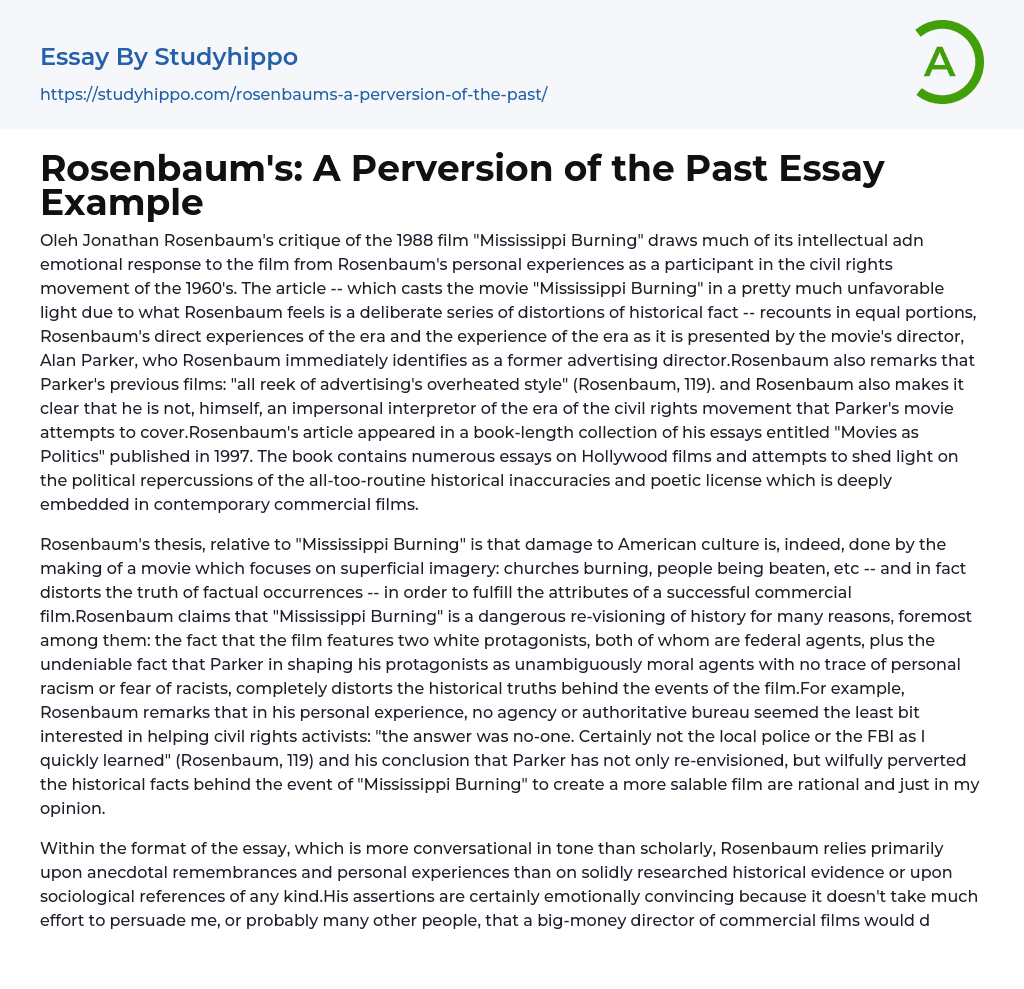Oleh Jonathan Rosenbaum's critique of the 1988 film "Mississippi Burning" is heavily influenced by his personal involvement in the civil rights movement of the 1960s. In his article, he discusses both his own experiences and the portrayal of the era in the film directed by Alan Parker who Rosenbaum identifies as a former advertising director. Rosenbaum believes that the film deliberately distorts historical facts, and notes that Parker's previous films "reek of advertising's overheated style" (Rosenbaum, 119). Additionally, Rosenbaum emphasizes that his own interpretation of the civil rights era is not impersonal like Parker's. The article is part of a collection of essays entitled "Movies as Politics" published by Rosenbaum in 1997. This book features numerous essays on Hollywood movies and critiques the political ramifications of widespread historical inaccuracies and poetic license in contemporary commercial films.
According to Rose
...nbaum, "Mississippi Burning" does damage to American culture by focusing on superficial imagery and distorting factual occurrences in order to achieve success as a commercial film. Rosenbaum argues that the movie's portrayal of two white protagonists as unambiguously moral agents with no personal racism or fear of racists is a dangerous re-visioning of history. He notes that in his experience, no agency seemed interested in helping civil rights activists, contradicting the film's portrayal of federal agents as heroes. Rosenbaum concludes that Parker has willfully perverted historical facts to create a more marketable film. I agree with his assessment.
In his essay, Rosenbaum adopts a conversational tone and relies heavily on anecdotal remembrances and personal experiences rather than on well-researched historical evidence or sociological references. He argues that big-money directors of commercial films would change or distort aspects of
history to produce economically successful movies, which, in his view, is the most significant problem with Parker's thesis. Although the historical "hook" may be apparent, Rosenbaum maintains that Hollywood movies primarily aim to provide entertainment rather than accurately depict historical events. He suggests that Parker's use of serious cultural issues for financial gain is exploitative, and he effectively portrays Parker as a director who prioritized financial success over historical accuracy.
- Travel essays
- Asia essays
- Caribbean essays
- Developing Country essays
- America essays
- City essays
- Africa essays
- Australia essays
- Europe essays
- Georgia essays
- Middle East essays
- New Zealand essays
- South Korea essays
- Thailand essays
- Afghanistan essays
- Dubai essays
- North Korea essays
- Natural Disaster essays
- Earthquake essays
- Fracking essays
- Mountains essays
- Restaurant essays
- Hospitality essays
- Business Travel essays
- Hotels essays
- Tourism essays
- World Tourism Organization essays
- Kids travel essays
- Travel Agency essays
- ecotourism essays
- Air Travel essays
- Sea Travel essays
- Cathedral essays
- Traveling essays
- Fast Food Restaurant essays
- Motel essays
- Cultural Tourism essays
- The real essays
- Airlines essays
- Airports essays
- Boeing essays
- Low-Cost Carrier essays
- Easyjet essays
- Bangladesh essays
- Kuala Lumpur essays
- Malaysia essays
- Manila essays
- Philippines essays
- Singapore essays
- Vietnam essays




